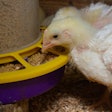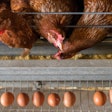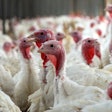
Does what you eat change how you feel? Apparently for chickens it can.
At the 2023 International Production & Processing Expo (IPPE), I was lucky enough to be invited to learn about new technologies, trends and challenges emerging for this coming year.
Eat good, feel good?
One product caught my eye because it reminded me more of a mental health treatment than a physical one. However, it makes sense since doctors sometimes prescribe healthier eating strategies to combat depression and other mental illnesses.
I sat down with Dr. Steve Lerner, Chr. Hansen’s senior scientific and business advisor for North America on January 25, 2023, and he explained recent research on what he called the gut-brain-microbiome axis.
Essentially, he said, by feeding birds a Chr. Hansen probiotic product daily – Gallipro Fit – birds become more comfortable, less skittish and receive body weight gain and feed conversion ratio improvements as well.
Simply put, the probiotic sets up a chemical reaction in the gut causing the intestinal tract of the bird to produce serotonin. It’s a hormone associated with well-being, and it likely affects how the bird feels. In theory, when the birds are happier, they are calmer and moving less and eating more leading to desirable results for growers and integrators.
Real-world results
Focusing on the feelings, Lerner said the product was recently studied in Brazil by researchers who tracked the standard performance metrics – body weight and feed conversion ratio – as well as welfare indicators, blood chemistry, gene expression and gut morphology.
The results of that study, he said, showed the birds fed the supplement were more comfortable and less skittish, as evidenced by allowing the researchers to get closer to them before fleeing. On a chemical level, the researchers observed a higher concentration of serotonin and lower concentrations of the hormone corticosterone, associated with stress, in the experimental group.
Moreover, the researchers noted the duodenal microvilli of birds fed the supplement presented 23% more surface area for the absorption of nutrients than the control birds.
I asked Lerner about anecdotal evidence in the U.S., where the product has been available for three years, and he said growers will note the houses are noticeably quieter with less vocalizations. Those flocks are less skittish and less prone to fighting, too. In layers, he heard about less feather pecking, fewer cracked eggs and again, less aggression, in the Gallipro Fit birds.














